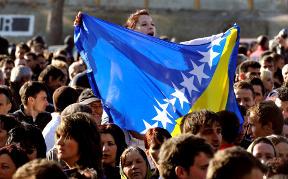As BiH protests continue, attention turns to Dayton accord

As BiH protests continue, attention turns to Dayton accord
Officials and citizens debate a re-organisation of BiH's intricate political landscape.
According to the European Parliament, any changes to the Dayton agreement must be a result of mutual agreement between local politicians. [AFP]
In the aftermath of protests about the country's stagnant economy and high unemployment that have led to promises of reform, the complex political system in Bosnia and Herzegovina (BiH) is increasingly being questioned by citizens and officials, some of whom are calling for re-organisation.
The internationally sponsored Dayton Peace Accord, which was signed in 1995 to stop ethnic conflict in the country, defined a power structure for BiH. But experts say that without dramatic changes the government has little chance of creating an efficient state with a positive investment climate.
"The Dayton Peace Accord created a disabled country where entities could act as a country within a country, which was definitely was not the original intention of the authors," said former Croatian President Stjepan Mesic.
The agreement split BiH into two entities. Republika Srpska (RS) is home to the Serb population, and the Federation of BiH (FBiH) has a majority Bosniak and Croat population. FBiH is split into 10 cantons, each with its own government. RS is divided into 80 municipalities, which also have their own local governments. The country also has a large administrative system with ministers and deputies at 14 levels of authority.
The country spends more than 4 billion euros on administration costs annually.
According to the European Parliament, a new accord is necessary, but it needs to be a result of mutual agreement...
- Log in to post comments










